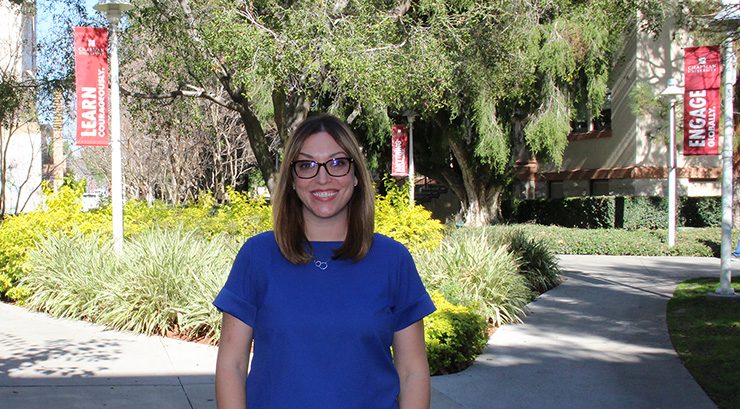
Attallah Faculty’s Peace Leadership Model Implemented by International Peacebuilders Program
February 1, 2022
 The Integral Peace Leadership Model, developed by Whitney McIntyre Miller, Ph.D., Associate Professor of Leadership Studies in Chapman University’s Attallah College of Educational Studies, has been adopted by the Euphrates Institute, a US-based nonprofit founded by Janessa Gans Wilder, a former CIA officer turned peacebuilder and social entrepreneur.
The Integral Peace Leadership Model, developed by Whitney McIntyre Miller, Ph.D., Associate Professor of Leadership Studies in Chapman University’s Attallah College of Educational Studies, has been adopted by the Euphrates Institute, a US-based nonprofit founded by Janessa Gans Wilder, a former CIA officer turned peacebuilder and social entrepreneur.
Over the last three years, the Euphrates Institute has implemented Dr. McIntyre Miller’s model as part of its Peace Practice Alliance (PPA), an international mentorship, training, and networking program. To date, a total of 78 peace leaders from 40 countries across the globe have participated in the Euphrates’ PPA program.
What Is Peace Leadership?
Dr. McIntyre Miller centers her research around peace leadership and community development and leadership.
Broadly defined as “the mobilization of action for just change,” integral peace leadership is a proactive, intentional approach of individual and collective action built through the interconnected development of skills and practices in order to challenge violence and aggression and create positive, just change.
“Peace leadership requires a movement beyond the self to the larger community utilizing theory and practice to make systemic change,” explained Dr. McIntyre Miller in her original paper (co-authored by Zachary Gabriel Green) applying the peace leadership theory to practice.
Over the course of subsequent publications and collaborations, Dr. McIntyre Miller has solidified her research into the Integral Peace Leadership Model, a framework that captures the “intersection of the skills and practices of Innerwork, Knowledge, Community, and Environment.”
“I developed the Integral Peace Leadership Model with my colleagues to create a more complete picture of what peace leadership entails so that these practices could be further studied and replicated,” said Dr. McIntyre Miller.
Euphrates Institute & PPA
 The Euphrates Institute has utilized Dr. McIntyre Miller’s Integral Peace Leadership Model to create the Peace Practice Alliance (PPA), a six-month peace leadership experience for peacebuilders worldwide.
The Euphrates Institute has utilized Dr. McIntyre Miller’s Integral Peace Leadership Model to create the Peace Practice Alliance (PPA), a six-month peace leadership experience for peacebuilders worldwide.
Grounded in Dr. McIntyre Miller’s model, the PPA program consists of six modules that guide participants through the peace leadership model and how to apply it in their work and lives. Each international cohort of emerging peacebuilders collaborates through intensive virtual learning sessions and community building experiential learning opportunities.
Head of Programs and Strategy at Euphrates Institute, sylvia murray, said Dr. McIntyre Miller’s Peace Leadership Model was adopted as the organization’s guiding theory because it aligned with its purpose, vision, theory of change, and mission as well as the personal beliefs and values of its individual members.
“The Peace Leadership Model fully captures how we believe peace can be practiced within ourselves, our relationships, our communities, and the world, and the individual and collective capacity for peace practice,” said murray. “Using the Peace Leadership Model as a guiding principle for the organization, it was natural to ground the Peace Practice Alliance program in this model.”
With the support of a mentorship program, PPA participants learn to apply the peace leadership model to projects in their communities, regions, and the world.
PPA’s Global Impact
At the culmination of the PPA program, participants use their experiences to effect change with the support of a global community and are tasked with leading and implementing peaceful projects in local and/or global contexts. PPA participants are also invited to apply for a grant in partnership with the Pollination Project to fund peace work in their communities.
Two cohorts, 48 peacebuilders in 26 countries, have completed the full six-month PPA program. Euphrates also recently announced a new cohort of peace leaders for the 2022 Peace Practice Alliance that includes 30 additional peace leaders from 17 countries, from Afghanistan to Vietnam, Nigeria to Palestine.

2022 cohort of peace leaders for the Peace Practice Alliance.
Over the course of the three years that the Euphrates Institute has utilized Dr. McIntyre Miller’s model, the PPA community has thus grown to include a total of 78 peace leaders from 40 countries.
Euphrates’ sylvia murray said that having access to that international community of practice is a key component of the PPA: “When a participant in India is inspired by the practice of another in Côte d’Ivoire, or when a participant in Hungary finds solidarity with a friend in South Africa, we see the sparks of peace leadership really ignite in minds and hearts.”
As one participant explained, “Participating in PPA helped me to put all things that I am working on into perspective, either for applying to some kind of funding or explaining to people why this work is so important in the context of my home country or an international context.”
Future Work
Following the success of the PPA, Dr. McIntyre Miller and her research partner Lisa Hilt are conducting a pilot study with the first cohort of PPA participants. Their study seeks to analyze the impact of the program on the peacebuilders’ efforts to effect change. These efforts have been supported by internal Chapman University research grants.
Also, Dr. McIntyre Miller is organizing a gathering at Chapman University in spring 2022 to explore ways to expand on the Euphrates Institute’s work and even develop a funded center or institute on peace leadership and peacebuilding.
Dr. McIntyre Miller also hopes to travel to Africa in fall 2022 with the Euphrates Institute for an in person PPA convening. (Final travel plans are dependent on fall pandemic-related travel regulations and restrictions.)
“I am humbled by the support of the Euphrates Institute and the success of its Peace Practice Alliance,” said Dr. McIntyre Miller. “As a researcher, it is so rewarding to see my work put into practice to promote and sustain community peacebuilding efforts around the globe.”

